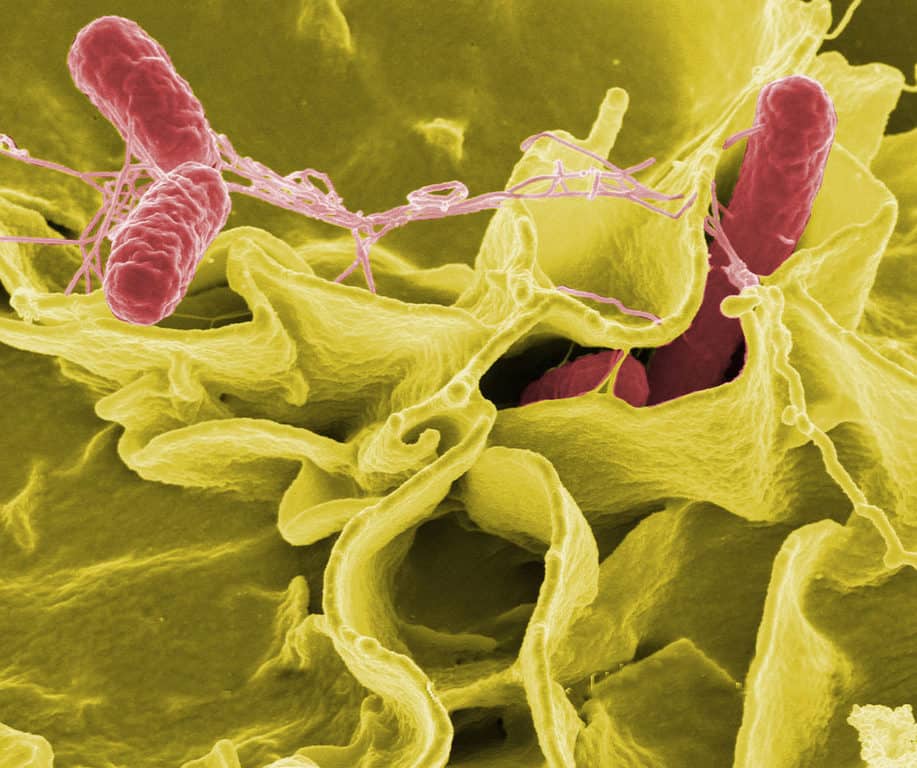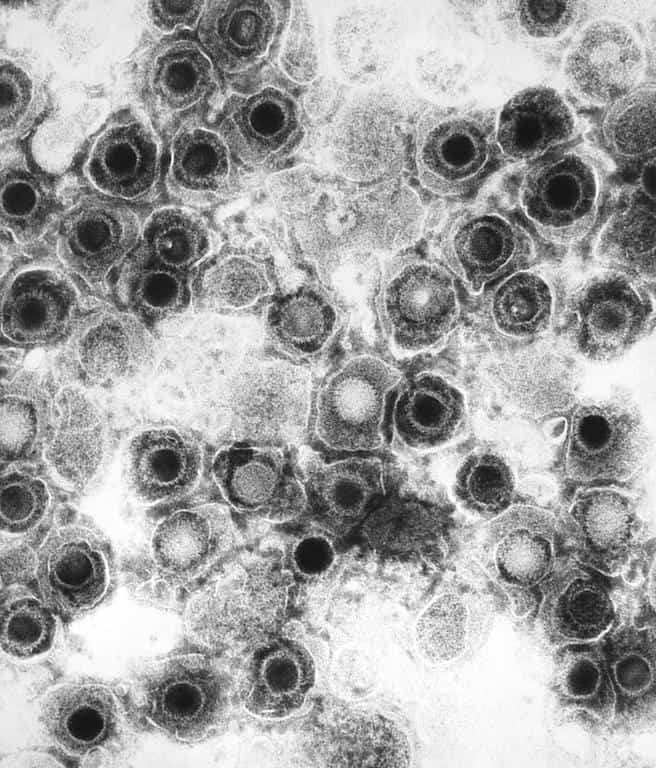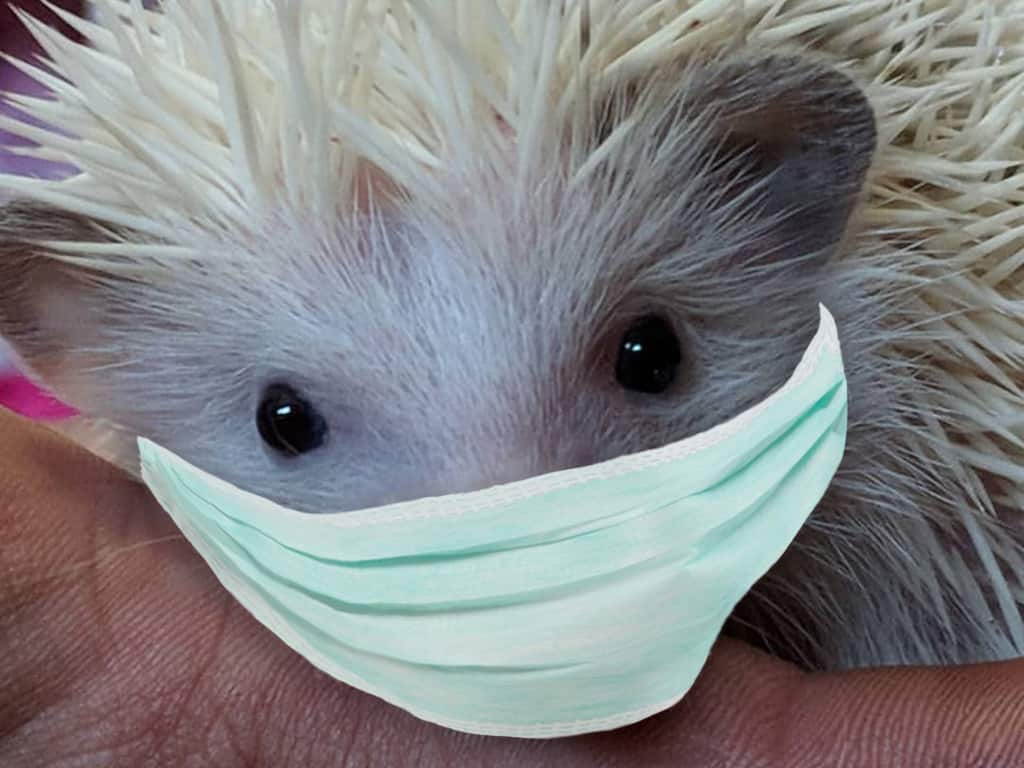Diseases that can be transmitted from animals to humans are called zoonotic diseases. And if you're wondering, “Do hedgehogs carry diseases harmful to humans?” – yes and no. Yes, it is entirely possible that hedgehogs can transmit certain diseases they may be carrying to humans. At the same time, that does not mean they are disease-laden by their mere existence. In this article, we will cover the most common diseases hedgehogs can carry that are harmful to humans, how they are transmitted, and our recommended best practices to remain healthy.
We will only be covering the most common diseases that pet hedgehogs can carry – if exposed to them. There are definitely obscure diseases that could be passed by your hedgehog to you IF they were infected with that pathogen. The reality is they'd have to be exposed to it first before passing it, so the chances of other rare diseases are negligible. If you're concerned that your hedgehog's illness is harmful to humans, ask their veterinarian. They have the most knowledge to make that determination.
AFFILIATE DISCLOSURE: Heavenly Hedgies is an Amazon Associate. We have partnered with them and other reputable merchants when they sell something that we feel will benefit our readers. By purchasing through our links, we may earn a small commission on sales, that helps us continue to provide informative and educational information for hedgie lovers. And the best part is that there is no additional cost to you. Thank you for being a loyal and supportive reader here at Heavenly Hedgies.
How Hedgehogs Carry Diseases To Humans
There are multiple ways that contagious pathogens pass between hedgehogs and humans. Although it's rare, some hedgehogs bite and/or scratch which can transmit germs. Other ways that humans can be infected is through touching urine, feces, saliva, blood, or other fluids your hedgehog secretes, either directly or indirectly [4].
Our skin is the largest organ we have, so naturally it's the primary source of pathogen entry. If you have any open wounds, it is best to keep an anti-bacterial cream like Neosporin on it, covered by a bandage. This includes minor wounds like a paper cut or a scratch that broke the skin. We make this recommendation for not only your safety, but also your hedgehog's.
Categories Of Diseases Hedgehogs can Carry
Whether it's carried by hedgehogs, humans, or some other living creature, diseases fall into four main categories:
- parasitic
- bacterial
- viral
- fungal
Within these categories, there are particular pathogens that can be passed from hedgehog to human. Let's explore the most common diseases within each category.
Parasitic Hedgehog Illnesses That can Pass to Humans
Cryptosporidium [1] is a species of parasite that has the ability to live in soil, food, or water. In fact, it can even survive on surfaces for a time and is resistant to hand sanitizers and chlorine. However, it is believed that the most common delivery method of this parasite is through water. Since it is so hardy, the risk factor is largely dependent on how clean your water source is where you live.
This nasty little parasite causes diarrhea and sometimes is accompanied with a persistent cough. It can be life-threatening to those that are immuno-compromised. However, most healthy people will be able to recover on their own if they keep themselves hydrated and replenish their electrolytes.
The best way to remain healthy is by using an ounce of prevention. If your water source is questionable, you can boil the water and let it cool. Since that can be rather inconvenient on an ongoing basis, there are two other methods. Use commercially bottled water or use a water filter that has the ability to filter parasites of this size. We actually do both with Quilly – bottled water for him to drink and filtered for his baths.
BACTERIAL Hedgehog Diseases that Humans Can Catch
Salmonella
Salmonella has caused quite a stir across the internet with regard to hedgehogs. While it's true that hedgehogs can carry and pass the disease to humans, that's only if they are exposed to it. Being a food-borne disease, they can't carry what they're not exposed to. This means that if you give your hedgehog any human food, make sure that it's thoroughly cooked. Also, since they can carry the bacteria without showing symptoms of being infected, good hand-washing habits should always be followed. Plus, as difficult as we know it is, you really should refrain from kissing your hedgie.

Salmonella causes diarrhea and may be accompanied by vomiting. As a matter of good health practice, anyone that has diarrhea and/or vomiting for more than 24 hour should see a doctor. Additionally, you should be replenishing your fluids and electrolytes that you're surely losing if you have diarrhea and vomiting. The good news is that people rarely die from it, but those that are immune-deficient should see a doctor sooner as opposed to later.
Yersinia pseudotuberculosis
Even though yersinia pseudotuberculosis is an uncommon zoonotic bacterial disease that hedgehogs can transmit, when it does happen it can be rather nasty. It's mainly found in the intestines and/or colon, mainly being a food borne bacteria. It can lead to bloody, mucous-covered stools, abdominal cramping, fever, rash, and in some cases, the sensation of an appendicitis attack.
The best way to prevent your hedgehog from contracting this bacteria is through avoidance of feeding raw meats. There are some hedgie parents that have asked about a raw diet, but clearly the risk outweighs the benefit. That is not to say that we oppose a diet that more closely matches the proteins they would receive in the wild. If you're looking into a more naturalistic diet, just make sure it is cooked, rather than raw.
Typical Viral Diseases Hedgehogs Can Spread
Rabies have been found as a viral hedgehog disease that can harm humans, but there should be little to no risk with a pet hedgehog that isn't exposed to wild animals. The hedgehogs that carried rabies were wild hedgehogs, undoubtedly attacked by another rabid animal.

More concerning to us is the discovery of Herpes, including herpes simplex, during the necropsy of a deceased pet hedgehog [2]. Because herpes simplex 1 and herpes simplex 2 are commonplace, a re-homed pet hedgehog could be a carrier without the new family knowing it. The best way to minimize exposure is by not touching sores with un-gloved hands, don't share food from your utensils, and wash your hands thoroughly with warm water and soap. And yes, there are some hedgie parents that will eat from a spoon or fork that was just licked by their hedgehog. Just don't do it, please!
Zoonotic Fungal Diseases Humans Can Catch From Hedgehogs
If you read our article “Hedgehog Illnesses and Symptoms“, you might recall that we mentioned that ringworm can be passed to humans and is not a parasitic worm. Ringworm has the scientific name Trichophyton mentagrophytes var. erinacei, and is probably one of the most common fungal diseases that hedgehogs can transmit. If caught early, some have claimed that humans can use athlete's foot cream on it. However, we're not sure which formula as there are several. This isn't something that we can confirm as we've never experienced it firsthand. Safety dictates that you should also use disposable gloves when handling your sick hedgie. Definitely get your infected hedgehog treated by a veterinarian.
Also within the fungal category, numerous species of candida exist that are zoonotic between hedgehogs and humans. Candida is a type of yeast and every mammal has a certain amount of it within the digestive system. Natural good gut flora keeps it balanced. However, there are circumstances that can tip the balance.
Antibiotics can disrupt the balance between good gut flora and candida. If the candida overtakes the other flora, it can not only cause illness in your hedgie, but also places you at risk by exposing you to an overabundance of candida [3]. Quilly always gets a probiotic after taking antibiotics and since we handle him, we take probiotics as well. At very least, humans should eat some yogurt daily after a run of antibiotics in your pet or yourself.
Since infections of pets and humans are often the result of human activity, a major aim in controlling zoonotic infections is to break the cycle of transmission, education must play a key role in their control.
The role of companion animals in the emergence of parasitic zoonoses
Can Humans Can Get Hedgehogs Sick?
Unfortunately yes. Zoonotic illnesses transmit both ways. If you come down with something and don't know where you got it or if you can give it to your hedgehog, ask your physician and your veterinarian! For whatever reason (no judgement here), If you aren't able to see a doctor right away, proceed with the precautionary assumption that you can infect your hedgehog. Below, we've given a list of our infection protection recommendations to use until you are completely better or have confirmed you are not contagious to your hedgehog.
Ways To Help Prevent Germ Transmission Between You And Your Hedgehog
If you are sick and aren't sure whether you're contagious to your hedgehog, have a friend or family member take care of feeding/watering your hedgehog, cleaning their cage, and changing their litter. Not only will this substantially reduce the risk of germ transmission, but it also helps you focus on getting well. This should continue until you are well or have received medical confirmation that you are not contagious.
Naturally, we understand that not everyone has this type of support network, so if the first recommendation isn't possible, take these safety measures:
- Keep your hedgehog quarantined away from you when not providing necessary hedgie care to reduce their exposure to possible contagions.
- Try to perform all care duties at once rather than multiple times per day. This will help reduce the number of exposure incidents.
- Before performing hedgehog care duties, wash your hands and exposed skin with an antibacterial/antimicrobial cleanser and dry with a disposable paper towel.
- Put on a disposable germ mask covering your mouth and nose to reduce the risk of spreading air-borne contagions.
- Use a fresh, unused pair of sanitary latex or nitrile gloves for each interaction with your hedgehog or their belongings.
- Use a disposable paper gown to cover your clothes or put on a clean set of clothes that aren't reused until they have been sanitized.
- Throw away all germ protection after each use.
Final Thoughts On Whether Hedgehogs Carry Diseases Harmful To Humans
While performing research for this article, we found that much of the research published was specific to wild hedgehogs. This was extremely frustrating. It's not that we don't love all hedgehogs, including wild ones. However, the relevancy to hedgehogs that are raised as pets isn't the same. Wild hedgehogs are exposed to all types of things that a pet hedgehog usually is never exposed to.
One take-away that we would like to emphasize is this…exercise safe practices while handling your hedgie to reduce risk of zoonotic contamination when either of you are sick. Additionally, there is more risk that wild hedgehogs carry diseases that can harm humans than domesticated hedgehogs. Most pet hedgehogs don't have exposure to a wide range of contagious pathogens because they live in the controlled environment of a loving home. There's no reason to stress out about it. Exercise good health practices and you'll both be fine.

